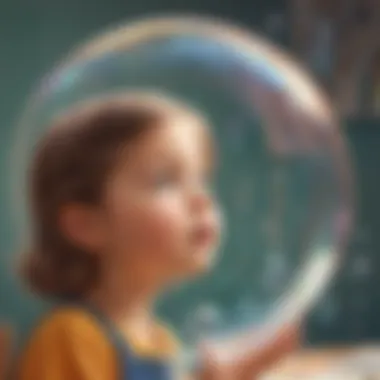Engaging Science Lessons for Kindergarten Explorers: Fostering Curiosity


Fun Activities Ideas
Introduction
Importance of Early Science Education
Early science education plays a pivotal role in nurturing a child's inquisitive nature and fostering a deep understanding of the natural world. As young learners engage in scientific practices, they cultivate skills such as observation, prediction, and analysis, which are vital for their overall academic growth. By immersing children in science from a tender age, we lay the groundwork for future success in fields requiring critical thinking and innovation.
Benefits of Hands-On Learning
Hands-on learning experiences bring science to life in ways that traditional instruction cannot replicate. By actively participating in experiments and interactive activities, kindergarten children forge direct connections between theory and practice. This hands-on approach not only enhances comprehension but also boosts retention as children remember concepts better when they engage all their senses in the learning process.
Overview of Science in Kindergarten Curriculum
The science curriculum for kindergarteners varies but largely focuses on introducing basic scientific principles through age-appropriate activities. Concepts such as exploring nature, understanding basic physics, and experimenting with everyday materials form the core of the kindergarten science curriculum. This early exposure to science sets the stage for future scientific inquiry by igniting a passion for learning and discovery.
Exploration of Fun Science Lessons


In this section, we delve into the captivating world of fun science lessons tailored specifically for kindergarten children. Understanding the importance of hands-on exploration at a tender age lays the foundation for a lifelong love for scientific inquiry and critical thinking. These lessons are meticulously designed to spark curiosity and foster a deep-rooted interest in science, igniting young minds with wonder and discovery.
Water Cycle in a Bag
The Water Cycle in a Bag experiment offers a unique perspective on understanding the natural processes of evaporation, condensation, and precipitation. Through this experiment, children can witness firsthand how water transforms from liquid to gas and back to liquid again, mimicking the water cycle in nature. This hands-on activity not only provides a visual representation of a complex scientific concept but also encourages active learning and experimentation, making it a valuable choice for this article. The simplicity of setting up this experiment coupled with its educational value makes it a popular and effective tool for engaging young learners in scientific exploration.
Invisible Ink Messages
Exploring the realm of Invisible Ink Messages introduces children to the fascinating world of secret communication and chemical reactions. This activity not only enhances their understanding of hidden messages and the science behind revealing them but also cultivates their sense of intrigue and mystery. The Invisible Ink Messages experiment offers a blend of creativity and science, enticing young learners to uncover hidden knowledge while immersing themselves in the wonder of discovery. Its interactive nature and element of surprise make it a favorable choice for this article, providing a fun and engaging way to introduce scientific concepts in a playful manner.
Fizzy Balloons
Fizzy Balloons present an exciting opportunity for children to observe chemical reactions in action, combining elements to produce a visual and fizzy spectacle. This experiment not only entertains young minds but also educates them on the principles of chemical changes and gas production. The unique sensory experience of inflating balloons with the fizzing reaction captures children's attention and instills a sense of awe and wonder in the world of science. With its interactive nature and demonstrative outcome, Fizzy Balloons serve as an excellent choice for this article, offering a dynamic and engaging way to explore scientific phenomena at home.
Nature Walk Observations
Kitchen Science Activities


Making Butter
Rainbow Density Jar
Edible Rock Cycle
STEM Building Challenges
Marshmallow Structures
Paper Bridge
Balloon Rocket
Science Storytelling Sessions
Virtual Science Simulations


Interactive Learning Resources
Online Science Apps and Games
Explore Learning
Explore Learning emerges as a pioneering force in the realm of online science education, providing a comprehensive platform for interactive learning experiences. With its immersive simulations, gamified challenges, and real-time feedback mechanisms, Explore Learning offers a dynamic approach to engaging children with scientific concepts. The platform's adaptive nature tailors activities to individual learning paces, ensuring a personalized and effective educational journey. This adaptive feature not only enhances comprehension but also cultivates a sense of autonomy and self-paced exploration in young learners. Despite minor glitches, the platform's interactive simulations and diverse content make it a valuable asset in fostering a holistic understanding of science among kindergarteners.
ABCmouse
ABCmouse, an acclaimed name in the realm of early education, presents a treasure trove of interactive science content for young learners. Combining fun activities, animated lessons, and interactive quizzes, ABCmouse captivates children's attention while imparting essential scientific knowledge. The platform's seamless integration of audio-visual elements and interactive games makes learning engaging and memorable. Additionally, its adaptive learning paths cater to individual progress, ensuring a tailored educational experience for every child. However, occasional technical hiccups and limited customization options may pose minor challenges in optimizing the platform for specific needs.
Science4Us
As a dedicated platform for elementary science education, Science4Us offers a specialized approach to introducing scientific concepts to young children. Through interactive lessons, virtual experiments, and engaging activities, Science4Us immerses learners in a virtual scientific realm, sparking curiosity and facilitating hands-on exploration. The platform's focus on experiential learning and interactive assessments enhances comprehension and retention, making complex scientific ideas accessible to young minds. However, limited advanced content and occasional navigational issues may hinder the platform's adaptability to diverse learning requirements.
Conclusion
Encouraging a Lifelong Love for Science
Encouraging a lifelong love for science among young learners is a pivotal objective in the educational landscape. By fostering a sense of wonder, instilling a passion for discovery, and introducing children to the joys of experimentation, the foundation for a sustained interest in scientific pursuits is laid. Nurturing this affection for science from the early years ensures that children develop a positive attitude towards learning, problem-solving, and critical thinking, leading to a well-rounded approach in their academic and personal endeavors.
Fostering Curiosity and Critical Thinking
Fostering curiosity and critical thinking skills in kindergarten children sets the stage for their intellectual growth and development. By encouraging inquisitiveness, promoting the exploration of unknown realms, and posing thought-provoking questions, educators and caregivers empower young minds to question, analyze, and draw connections between different scientific phenomena. This nurturing of curiosity enhances mental agility, nurtures problem-solving abilities, and cultivates a foundation for lifelong learning and adaptability in an ever-changing world.



